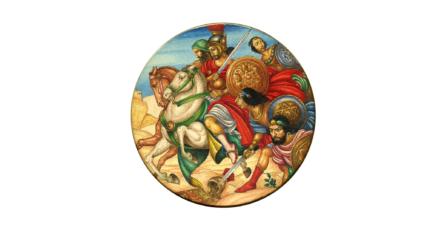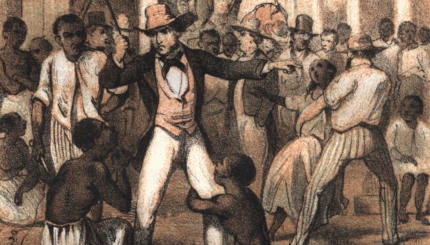Jacob Frank (1726-1791) was a charismatic Jew in the Russian Empire who founded and led a controversial quasi-Christian movement that was inspired by Shabbateanism, the beliefs of false messiah Shabbetai Zevi and his followers.
Starting in 1755, Frank, who boasted of his ignorance of the , began preaching a variation on Shabbatean theology, which he’d learned about while living and working as a merchant in the Ottoman Empire, in small secret gatherings in the Podolia region (in what is now Ukraine and Moldova).
In The Jewish Religion, Rabbi Louis Jacobs describes Frank’s theology as a “curious amalgam of Kabbalistic, Shabbatean, and Christian beliefs, an antinomian mystery religion which seeks to transcend all the religions.” Frank’s followers believed that they were obligated to break free from the restraints of Jewish law. They outwardly adhered to Jewish law, but participated in orgies, which they believed were religious acts.
Upon learning of the Frankist gatherings, Podolia’s rabbis forced Frank to leave the region and tried his followers in rabbinical courts, where many confessed to breaking marriage vows and engaging in sexually promiscuous behavior. A herem (excommunication) was proclaimed against members of the group, provoking a wave of persecution against them. In the face of persecution from the organized Jewish community, group members sought protection from the Catholic church, telling the local Catholic bishop that they rejected the Talmud and recognized only the Zohar, a Jewish mystical text. They also told Catholic authorities that they recognized the messiah as part of the Trinity, although they did not clarify that they considered Zevi, rather than Jesus, to be the messiah.

Help us keep Jewish knowledge accessible to millions of people around the world.
Your donation to My Jewish Learning fuels endless journeys of Jewish discovery. With your help, My Jewish Learning can continue to provide nonstop opportunities for learning, connection and growth.
In the late 1750s, Frank returned to Podolia, claiming to be a direct successor of Zevi and assuring his adherent that he had received revelations from God. These revelations called for Frank and his followers to convert to Christianity, which was to be a transition stage to a future “messianic religion” (in which Frank was the messiah.) In 1759, the Frankists began negotiations with Polish Catholic officials to undergo a mass conversion to Christianity
The baptism of more than 500 Frankists, including Frank himself, was celebrated in the local churches, with members of the Polish nobility acting as godparents. The newly baptized adopted the names of their godfathers and godmothers, and ultimately joined the ranks of the Polish nobility. However, they clashed with church officials when they continued to intermarry only among themselves and to hold Frank in reverence, calling him “the holy master.”
Frank was arrested in Warsaw in 1760 and brought before to the Church’s tribunal on the charge of feigned conversion to Catholicism and the spreading of a pernicious heresy. The tribunal convicted Frank as a teacher of heresy, and imprisoned him in a monastery for 13 years. While Frank was in prison, his influence only increased, with his followers viewing him as a martyr. Many remained in contact with him, and he told them salvation could be gained only by following a mixture of Christian and Shabbatean beliefs. After his release from prison in 1772, Frank lived for 14 years in the Moravian town of Brünn, where he was surrounded by a sectarians and “pilgrims” who came to visit him.
Frank repeatedly traveled to Vienna, where he for a time succeeded in gaining the favor of Joseph II, the Holy Roman Emperor. However, he ultimately was forced to leave Austria and moved to a small German town, where he assumed the title of Baron of Offenbach and lived as a wealthy nobleman, receiving money from his Polish and Moravian adherents, who made frequent pilgrimages to Offenbach. After Frank’s death, his daughter Eve became the “holy mistress” and the leader of the sect. However, as the number of pilgrims and their funds decreased, Eve fell into debt, dying in 1816.
The Frankists scattered in Poland and Bohemia gradually assimilated with the surrounding Catholic population.
Adapted from the Jewish Encyclopedia.
Torah
Pronunced: TORE-uh, Origin: Hebrew, the Five Books of Moses.
Help us keep Jewish knowledge accessible to millions of people around the world.
Your donation to My Jewish Learning fuels endless journeys of Jewish discovery. With your help, My Jewish Learning can continue to provide nonstop opportunities for learning, connection and growth.



